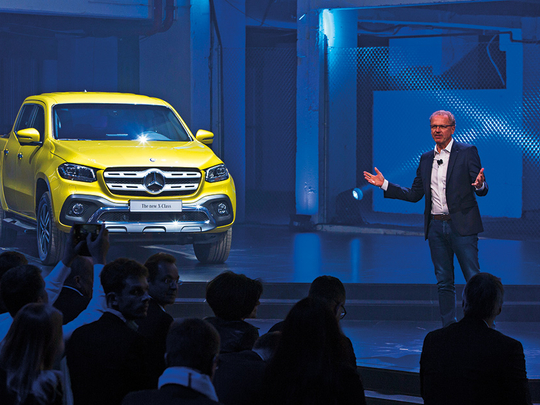
Munich: Daimler AG moved to head off a growing crisis over emissions concerns by voluntarily recalling more than 3 million Mercedes-Benz diesel vehicles in Europe, marking the latest blow to the technology since Volkswagen AG’s cheating scandal erupted nearly two years ago.
The automaker will extend an ongoing upgrade of about 250,000 compact cars and vans to nearly every modern Mercedes diesel on the road. The plan, which involves a software patch and avoids complex component fixes, will cost about €220 million (Dh931 million, $255 million), the Stuttgart, Germany-based company said in a statement on Tuesday. If accepted by officials, it could help Daimler avoid the massive penalties that beset VW.
“This is about managing diesel’s decline as gently as possible and to get a little bit of reprieve,” said Arndt Ellinghorst, a London-based analyst with Evercore ISI. “That’s not going to change the fundamental direction of the shift in technology.”
Diesel technology, which powers about half of the cars sold in Europe every year thanks to taxes that make the fuel cheaper at the pump, has been increasingly under attack since Volkswagen admitted to duping regulators in September 2015. With diesel crucial to Daimler’s strategy to meet targets for lower carbon-dioxide emissions, the automaker can ill afford to have the technology further sullied by doubts and allegations.
Rapid roll-out
As well as recalling diesels with Euro-5 and -6 emissions standards, the manufacturer also plans a “rapid” roll-out of a completely new diesel engine family, the carmaker said.
The plan marks a change of approach after Daimler vowed to fight accusations of cheating by “all legal means” following a meeting with government officials in Berlin last week. The crisis has clouded Daimler for months, with hundreds of police officers and prosecutors searching company sites in May. German authorities have been scrutinising the carmaker for possible emissions cheating involving two engines used by Mercedes, and Daimler also is the subject of a US probe into allegedly excessive diesel emissions.
“This is finally a proactive move to put something on the table and a solid attempt at getting out in front of the debate,” said Juergen Pieper, a Frankfurt-based analyst with Bankhaus Metzler. Daimler’s estimation for the cost of the recall, at about €70 per car, is “extraordinarily low” and could rise, he said.
Daimler shares gained 0.4 per cent to €64.45 at 9:05am in Frankfurt, paring their decline this year to 8.8 per cent.
Diesel crackdown
Unlike Volkswagen, which admitted it deceived regulators, Daimler says it adhered to regulations that allow vehicles to reduce emissions controls to protect a car’s engine. Still, ongoing concerns about diesel in the aftermath of the VW scandal have prompted the home states of Daimler, BMW AG and Audi to push for fixes on older models to cut air pollution.
The emissions crackdown extends beyond Germany, with France’s Energy Minister earlier this month saying the country would end the sale of gasoline- and diesel-powered vehicles by 2040. Paris, Madrid, Athens and Mexico City have all said they will ban diesel vehicles from their roads by 2025.
One of Daimler’s peers is pre-empting these stricter rules. Volvo Car Group said this month it will phase out vehicles powered solely by fossil fuels and offer only hybrid or full-electric motors on every new model launched in 2019 or later. The Swedish carmaker expects to have five fully electric vehicles in its line-up by 2021 and make its last full-gasoline or diesel car in about 2025.
Gut punch
“The Daimler recall is another punch in the gut to the diesel industry, and an additional black mark in terms of public perception, but the fuel isn’t going away,” said Michael Harley, group managing editor for Cox Automotive. “Automakers continue to believe in a future with diesel technology”.
The recall, which will be free for customers, will take several months, according to Daimler spokesman Matthias Brock. The plan extends a service action on compact cars and V-Class vans. About 45 per cent of smaller cars and 75 per cent of vans have since been upgraded since March. Daimler has informed German authorities about its decision, Brock said. Germany’s Transport Ministry declined to comment on the recall.
“The public debate about diesel engines is creating uncertainty,” Chief Executive Officer Dieter Zetsche said in a statement on Tuesday. “We have therefore decided on additional measures to reassure drivers of diesel cars and to strengthen confidence in diesel technology.”












